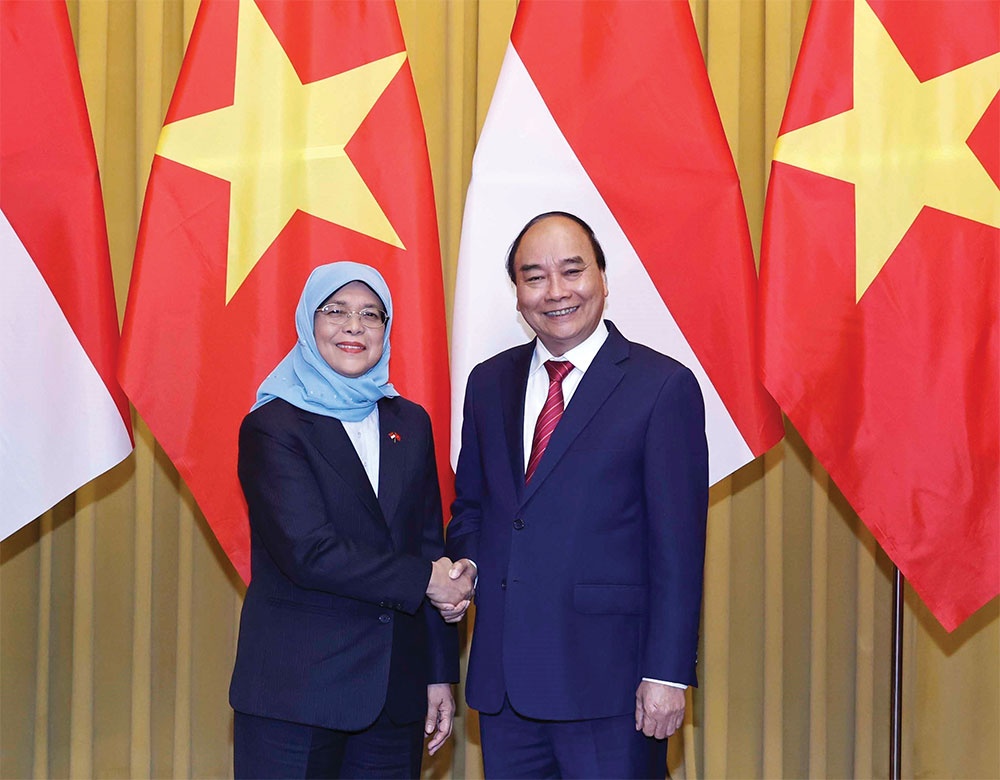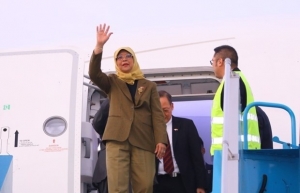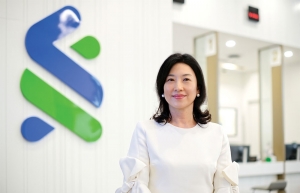Singapore ratchets up economic ties
During Singaporean President Halimah Yacob’s state visit to Vietnam last week, she and counterpart Nguyen Xuan Phuc witnessed in Hanoi the inking of four MoUs, two of which were for energy cooperation and carbon credit collaboration.
“These agreements will strengthen the multifaceted cooperation between Singapore and Vietnam,” President Yacob said. “Earlier this year we agreed to deepen cooperation in defence, trade, digital economy, and intellectual property. These new agreements will expand our work in growing areas such as renewable energy, carbon credits, cybersecurity, and vocational training, and will be the foundation of our refreshed bilateral agenda as we pursue a greener, cleaner, and more resilient future.”
 |
| Singaporean President Halimah Yacob met with Vietnamese counterpart Nguyen Xuan Phuc last week in Hanoi, photo VNA |
Both leaders agreed that bilateral cooperation in trade and investment, defence, security, education, and human resource development were substantive, wide-ranging, and mutually beneficial.
“They affirmed the extensive and robust cooperation between the two countries, and agreed to step up cooperation in new and emerging areas such as digitalisation and cybersecurity, the green economy including renewable energy and carbon credits, sustainable infrastructure, as well as vocational training to equip our people for the economy of the future,” read a statement from the Singaporean Ministry of Foreign Affairs.
Authorised agencies from Vietnam and Singapore will soon work with each other to formulate specific mechanisms and incentives to facilitate businesses from both sides to engage in the new cooperation fields.
The MoU on energy cooperation embraces the development and financing of renewable energy and interconnectors for increased grid resilience and stability and cross-border electricity trading.
It also paves the way for cooperation in liquefied natural gas and electricity markets, research and development and implementation of low-carbon energy technologies and solutions such as hydrogen, ammonia, energy storage systems, smart grids and related infrastructure, as well as energy efficiency and carbon services.
The Vietnam-Singapore cooperation on carbon credits and markets is in line with Article 6 of the Paris Agreement, which allows countries to transfer carbon credits earned from reducing greenhouse gas emissions to help them meet their climate targets.
Singapore targets to hit net-zero emissions around mid-century, and Vietnam last November declared that it will make efforts to achieve net-zero emissions by 2050 with its own resources and international support.
Meanwhile, Vietnam and Singapore have established a working group on digital economy cooperation. During President Phuc’s state visit to Singapore in February, both nations inked an MoU on the topic, and a joint working group was tasked with implementing related collaborations between the two countries.
“The working group will explore new areas of cooperation such as cross-border data flows, cybersecurity, AI governance, and electronic payments, including with regulatory sandboxes,” Singaporean Ambassador to Vietnam Jaya Ratnam once told VIR. “Our bilateral digital cooperation aims to establish common norms and interoperable systems. This will provide the foundation for Vietnamese and Singaporean companies to transact with each other easily and securely, and enable them to grow their digital businesses. Establishing common ground in these areas will also help to increase the adoption of emerging technologies in a safe and trusted manner, and promote greater innovation.”
Singapore is now Vietnam’s second-largest foreign investor, with total registered capital of about $70.15 billion. “This demonstrates the confidence that Singaporean investors have in Vietnam’s economic potential and the Vietnamese government’s efforts to boost the ease of doing business here. Despite the disruptions of the pandemic and the current global economic downturn, Singaporean companies continue to seek new opportunities to diversify and expand their presence in Vietnam,” Ambassador Ratnam said.
According to the Vietnamese Ministry of Planning and Investment (MPI), as of September 20, total registered investment from Singapore into Vietnam was worth $70.15 billion – making Singapore the largest foreign investor in Vietnam and within ASEAN, followed by Thailand ($13 billion), Malaysia ($13 billion), Brunei ($961 million), and Indonesia ($621.3 million).
During January-September 20, Singapore became the largest investor in Vietnam with the total new investment of $4.75 billion, followed by Thailand ($254.5 million) and Malaysia ($175 million).
One agreement set up last week involved granting the licence to develop the 12th Vietnam-Singapore Industrial Park (VSIP) in the Mekong Delta city of Can Tho. Sembcorp Development, a wholly-owned subsidiary of Sembcorp Industries, received the licence. The 293.7-hectare park will be operated by VSIP Group. Sembcorp is the joint master developer of the VSIP projects together with long-standing partner Becamex IDC.
Singaporean President Yacob last week also toured the VSIP Bac Ninh Park I in the northern province of Bac Ninh. The 635-hectare integrated township and industrial park broke ground in 2007. It has attracted 125 companies with $2.5 billion in investment capital and created 40,000 employment opportunities.
Vietnam-Singapore trade turnover hit $8.3 billion last year, up 23 per cent on-year. The figure reached nearly $7 billion in the first nine months of this year, up 16 per cent. The pair will mark 50 years of diplomatic relations next year, as well as 10 years of a strategic partnership.
 | Singapore authorises use of Pfizer’s COVID-19 vaccine on under-five children Singapore has recently approved Pfizer's Comirnaty COVID-19 vaccine for use on children aged six months to four years. |
 | Singaporean President begins State visit to Vietnam Singaporean President Halimah Yacob and her spouse began a State visit to Vietnam on October 16 at the invitation of President Nguyen Xuan Phuc. |
 | Why Singapore and Vietnam together mean business At first glance, there may appear to be few similarities between the economies of Vietnam and Singapore. One is a leading exporter of consumer electronics, textiles, and footwear while the other is a global hub for shipping, technology, and financial services. Yet, like many successful partnerships, strong potential synergies exist. |
What the stars mean:
★ Poor ★ ★ Promising ★★★ Good ★★★★ Very good ★★★★★ Exceptional
Related Contents
Latest News
More News
- Vietnam, New Zealand seek level-up in ties (February 19, 2026 | 18:06)
- Untapped potential in relations with Indonesia (February 19, 2026 | 17:56)
- German strengths match Vietnamese aspirations (February 19, 2026 | 17:40)
- Kim Long Motor and AOJ Suzhou enter strategic partnership (February 16, 2026 | 13:27)
- Haiphong welcomes long-term Euro investment (February 16, 2026 | 11:31)
- VIFC in Ho Chi Minh City officially launches (February 12, 2026 | 09:00)
- Norfund invests $4 million in Vietnam plastics recycling (February 11, 2026 | 11:51)
- Marico buys 75 per cent of Vietnam skincare startup Skinetiq (February 10, 2026 | 14:44)
- SCIC general director meets with Oman Investment Authority (February 10, 2026 | 14:14)
- G42 and Vietnamese consortium to build national AI infrastructure (February 09, 2026 | 17:32)

 Tag:
Tag:















 Mobile Version
Mobile Version